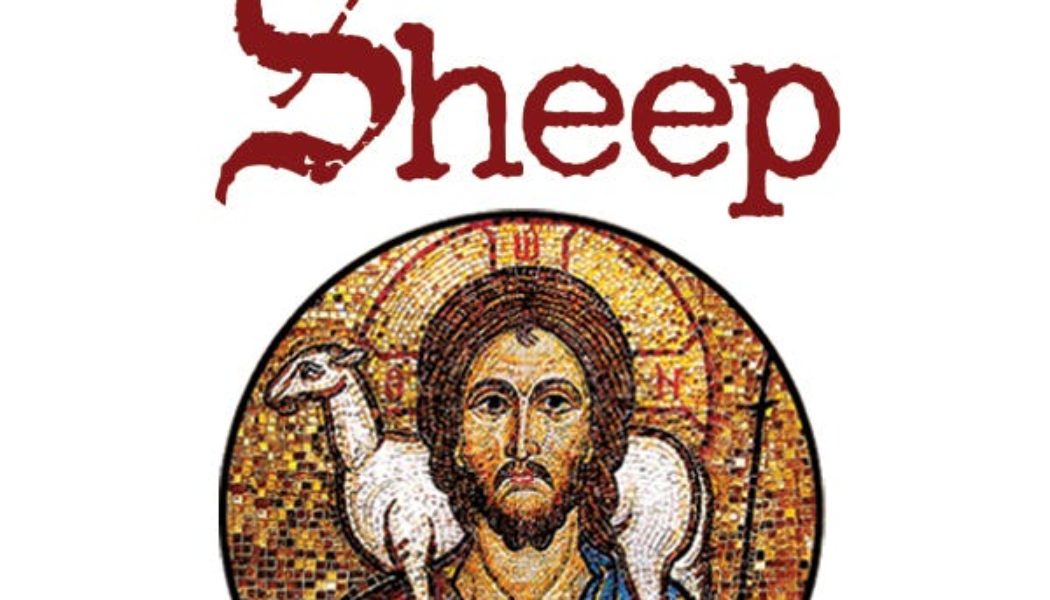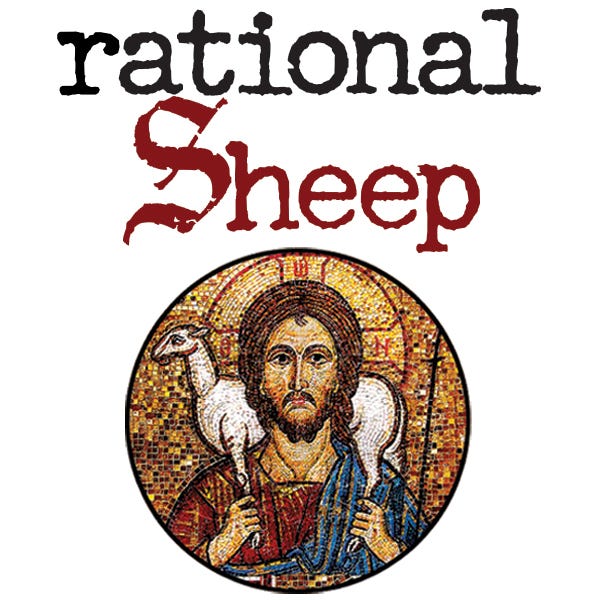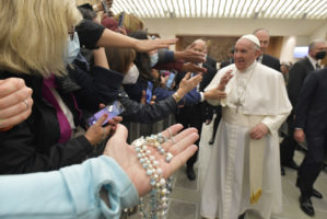Expel from him (her) every evil and unclean spirit which hides and makes its lair in his (her) heart. Priest: The spirit of deceit, the spirit of evil, the spirit of idolatry and of every 4 covetousness; the spirit of falsehood and of every uncleanness, which operates through the prompting of the devil. And make him (her) a reason-endowed sheep in the holy flock of Thy Christ, an honorable member of Thy Church, a consecrated vessel, a child of the light and an heir of Thy Kingdom, that having lived in accordance with Thy commandments, and preserved inviolate the seal, and kept his (her) garment undefiled, he (she) may receive the blessedness of the Saints in Thy Kingdom. (From the Orthodox baptism rite)
The name of this Substack project is “Rational Sheep.” I am told that, in the original Greek, that’s “probaton logikon” — but that’s above this mass-media professor’s paygrade. In some Orthodox Christian rites this is translated as “reason-endowed sheep,” but that doesn’t work very well in a headline.
The key is that these sheep can communicate, with some degree of reason, and they are following their Shepherd. For the purposes of this project we will assume that they can read and use devices with digital screens.
But let’s jump in a time machine, flash back to 1990, and consider the academic adventure that is at the heart of Rational Sheep. I am referring to my leap from a mainstream newspaper to Denver Seminary, where I worked with the late Haddon Robinson on a project (it failed, in the end) to study the many ways that mass-media (think movies, television, music, news, etc.) shape the environment in which pastors, counselors, church-planters, youth ministers and others work. My academic title was Communicator on Culture.
Early on, I set up a large bulletin board in the lobby outside the auditorium and main classrooms and began filling it with articles from magazines and newspapers. These clips pointed to trends in popular culture and news and that I thought seminary students and professors would need to see. Note: This was the cable-television age, but we knew (see George Gilder’s “Life After Television” in 1990) that the World Wide Web and hand-held screens loomed ahead.
One morning, I arrived for work and discovered that someone had destroyed the bulletin board, scattering push-pins and shredded articles all over the lobby. This person left no note and never told anyone at Denver Seminary why they did what they did (or this was not communicated to me). We took down the offensive board.
What was going on and what does this have to do with Rational Sheep?
In a tribute to Robison (in the book “The Big Idea of Biblical Preaching”) I contributed a chapter focusing on that mass-media literacy project. It contained the following classroom episode, which is long, but essential:
The Master of Divinity student was confused and angry. Why was it so important, he asked, to analyze news and entertainment trends? Everyone knows that the secular media are liberal and opposed to the church. So why spend so much classroom time talking about popular culture? After all, he said, he came to seminary to learn how to be a pastor. What did this media stuff have to do with that?
“Now, pretend that I don’t speak fluent evangelical, I said, in response. “Tell me, in simple English, about a subject that really matters to seminary students.”
In the front row, a student answered: “Discipleship.”
That’s a code word, I said. What does “discipleship” mean?
The student said that he wanted his ministry to touch the real lives of real people. He wanted to affect their views on the big issues, such as jobs, marriage and money. “I want the faith to affect … how they really live,” he said.
I agreed. “Discipleship,” if taken seriously, should have an impact on checkbooks, pocket calendars, parenting and daily life. Then I pivoted and pointed to my list of the major forms of modern mass media — television, advertising, movies, print and video news media, popular music, etc. Of course, these secular media, I joked, don’t influence how people view work, success, sex, family, divorce, children, life, death or eternity. And the folks who run the media never ignore or knock Christianity. Right?
Looking around, I could see lights clicking on. At that moment, I improvised a kind of journalistic definition of “discipleship,” consisting of three questions: How do you spend your time? How do you spend your money? How do you make your decisions? If pastors can answer these questions today in America without colliding with the power of mass media, then they have a promising future in ministry to the Amish.
That was 1991 and, as far as we could tell, I was teaching the only core-curriculum seminary class about these realities in American and global culture. The goal was to prepare graduates to look for the role mass-media play in shaping the lives of the unchurched and, of course, people in pews.
Today? I have searched and it appears (let me know if I’m wrong) there are still zero core-curriculum seminary classes being offered on this topic.
Think about that. It’s kind of like sending missionaries into a foreign culture without asking them to learn its language, great myths, humor, the forces shaping public discourse and how ordinary people live their daily lives. Remember that Marshall McLuhan quote about fish not being able to see the water in which they swim? Mass media is the water surrounding believers and unbelievers swimming through this digital age.
Remember that Marshall McLuhan quote about fish not being able to see the water in which they swim? Mass media is the water surrounding people swimming through the digital age.
Robinson and I were not arguing that everything in the tsunami of mass-media content was worthy of serious attention. Instead, our goal was to help believers learn how to recognize “signals” from mass culture that truly mattered. Back to that tribute chapter:
So what is a “signal?” I define this as a single piece of media or popular culture focusing on a subject that is of vital interest to the church. It can be a newspaper article, a single episode of a television show, a compact disc, a movie, a new video, a best-selling book or some other item. The goal is to tune in a single worthy signal, out of the millions the media pour over us every day. Above all, preachers must learn to recognize when the media launch a major invasion into biblical territory.
Here at Rational Sheep, we will cut that down a bit: A “signal” is a piece of mass culture that raises an issue that clergy and the faithful cannot afford to ignore. That’s how I defined the term when teaching “Exegete the Culture” seminars during my years at Milligan College and Palm Beach Atlantic University.
My goal is to start spotting “signals,” once again, and point readers and listeners to media reports (and other resources) about them — with some of my own commentary about why they matter. Hold that thought.
Let me confess that I am not a natural essay writer who can pour his thoughts into a diary. I am reporter. Also, this new Substack project will not, as with the 20-year run with the GetReligion blog (massive archive is right here), be criticism focusing on journalism. That said, many “signals” appear in news and that will require discussing the journalism age in which we live (see my Religion & Liberty essay, “The Evolving Religion of Journalism”). My weekly “Crossroads” podcasts with Lutheran Public Radio will continue and readers will be able to access them through this Substack feed.
Also, let me stress that this will not be a political blog. However, it’s impossible to talk about mass-culture issues ranging from Disney culture to social-media addictions without raising “culture wars” issues that many will insist are about politics, as opposed to morality, doctrine and faith.
This will not be a newsletter that focuses on reviewing movies, television, popular music, video games and other forms of entertainment. But many important signals — even most — are linked to coverage of the entertainment industry.
This project is not about technology, alone, but parents and pastors cannot ignore powerful trends in digital technology. Family life after the iPhone is quite different than it was before Steve Jobs changed the world. There is no way to avoid discussing the reality that researchers call “screen culture.”
Will this feed be a diary full of personal reflections? Not really, but — let’s face it — I just turned 70 a few weeks ago and that will affect my life. Nothing makes a 70th birthday “special” like an emergency brain MRI (It was Bell’s Palsy, not a stroke). If I am able to bring “Exegete the Culture” back to a classroom, I can imagine the occasional lecture showing up here and on YouTube.
Many will ask if this is an “Orthodox” project, since I am an Orthodox layman. Well, it will be linked to my new work as a think-tank fellow and adjunct professor with Saint Constantine College. My faith is the lens through which I view all of this, especially my life as a parent and grandparent. But I will note that, after growing up as a Southern Baptist preacher’s kid, my roots are very important to me.
What can readers and listeners expect via Rational Sheep? My goal is to offer subscribers two “signals” a week, but travel may affect that from time to time. I want to do a Rational Sheep podcast once a week in which I read one of those “signal” posts — for those who prefer that format — and offer additional commentary. The plan is to do a live monthly Q&A chat, working with the Issues, Etc., team that produces “Crossroads,” that will then be available here and, who knows, maybe on YouTube. If we get enough questions (through the Issues call-in line and comments through Substack) we may do more. This Substack will, for some readers, be a convenient hub where they can find and help support my work on other platforms.
That is, if Team Mattingly folks here in Oak Ridge can learn to handle all of this. My children want me, for example, to put out a podcast version of my original 1982 interview with that young Bono guy from U2. Could I get some Billy Graham interview materials off old cassettes? We will see.
In the first weeks, introductory posts will be free while we get our act together. There will be full texts of a few essays and commentaries from the Denver Seminary era.
In the meantime, look for the #RationalSheep hashtag on X via @tweetmattingly and @GetReligion. Ask questions. Spot typos. Help spot “signals.” Ponder what it would mean to live and worship as Rational Sheep. Let’s get started.










